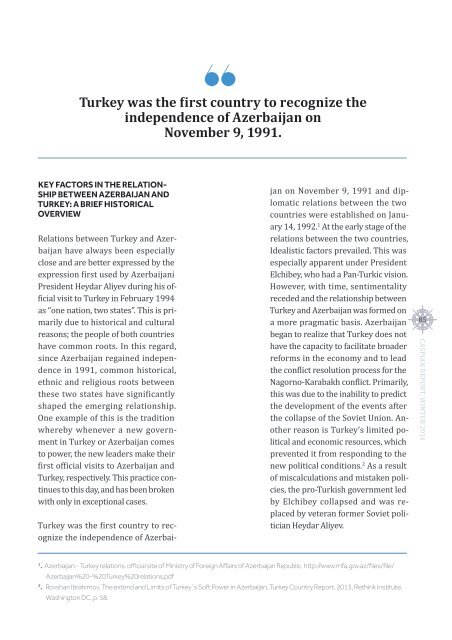Caspian Report - Issue 06 - Winter 2014
Create successful ePaper yourself
Turn your PDF publications into a flip-book with our unique Google optimized e-Paper software.
Turkey was the first country to recognize the<br />
independence of Azerbaijan on<br />
November 9, 1991.<br />
KEY FACTORS IN THE RELATION-<br />
SHIP BETWEEN AZERBAIJAN AND<br />
TURKEY: A BRIEF HISTORICAL<br />
OVERVIEW<br />
Relations between Turkey and Azerbaijan<br />
have always been especially<br />
close and are better expressed by the<br />
expression first used by Azerbaijani<br />
President Heydar Aliyev during his official<br />
visit to Turkey in February 1994<br />
as “one nation, two states”. This is primarily<br />
due to historical and cultural<br />
reasons; the people of both countries<br />
have common roots. In this regard,<br />
since Azerbaijan regained independence<br />
in 1991, common historical,<br />
ethnic and religious roots between<br />
these two states have significantly<br />
shaped the emerging relationship.<br />
One example of this is the tradition<br />
whereby whenever a new government<br />
in Turkey or Azerbaijan comes<br />
to power, the new leaders make their<br />
first official visits to Azerbaijan and<br />
Turkey, respectively. This practice continues<br />
to this day, and has been broken<br />
with only in exceptional cases.<br />
Turkey was the first country to recognize<br />
the independence of Azerbaijan<br />
on November 9, 1991 and diplomatic<br />
relations between the two<br />
countries were established on January<br />
14, 1992. 1 At the early stage of the<br />
relations between the two countries,<br />
Idealistic factors prevailed. This was<br />
especially apparent under President<br />
Elchibey, who had a Pan-Turkic vision.<br />
However, with time, sentimentality<br />
receded and the relationship between<br />
Turkey and Azerbaijan was formed on<br />
a more pragmatic basis. Azerbaijan<br />
began to realize that Turkey does not<br />
have the capacity to facilitate broader<br />
reforms in the economy and to lead<br />
the conflict resolution process for the<br />
Nagorno-Karabakh conflict. Primarily,<br />
this was due to the inability to predict<br />
the development of the events after<br />
the collapse of the Soviet Union. Another<br />
reason is Turkey’s limited political<br />
and economic resources, which<br />
prevented it from responding to the<br />
new political conditions. 2 As a result<br />
of miscalculations and mistaken policies,<br />
the pro-Turkish government led<br />
by Elchibey collapsed and was replaced<br />
by veteran former Soviet politician<br />
Heydar Aliyev.<br />
85<br />
CASPIAN REPORT, WINTER <strong>2014</strong><br />
1<br />
. Azerbaijan - Turkey relations, official site of Ministry of Foreign Affairs of Azerbaijan Republic, http://www.mfa.gov.az/files/file/<br />
Azerbaijan%20-%20Turkey%20relations.pdf<br />
2<br />
. Rovshan Ibrahimov, The extend and Limits of Turkey`s Soft Power in Azerbaijan, Turkey Country <strong>Report</strong>, 2013, Rethink Institute,<br />
Washington DC, p. 58.










